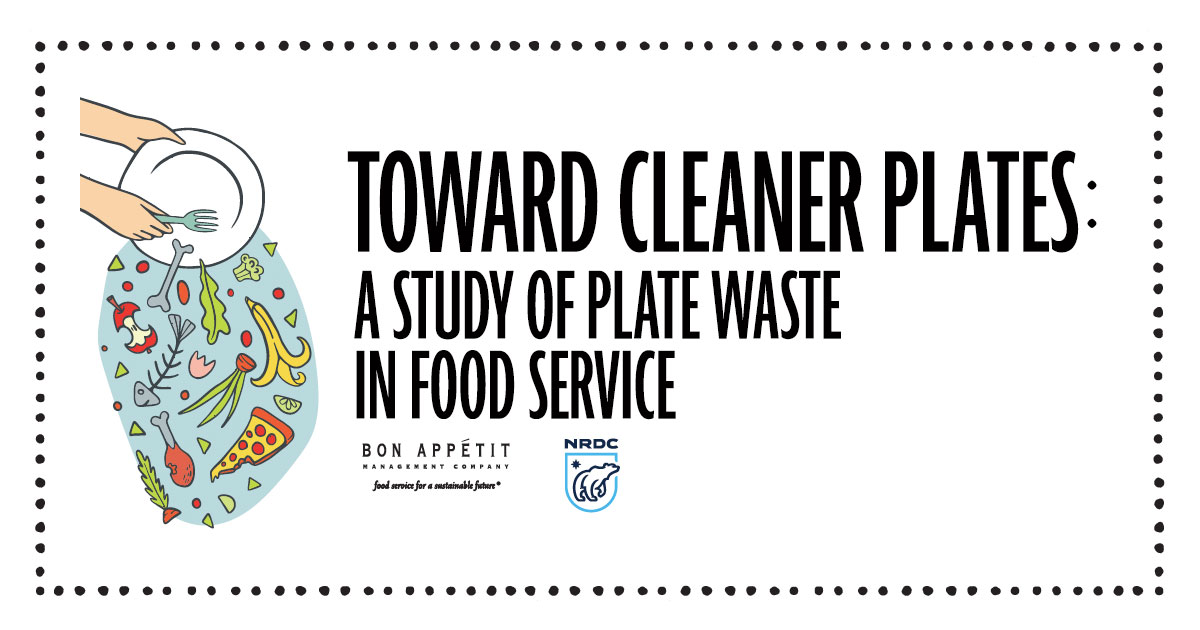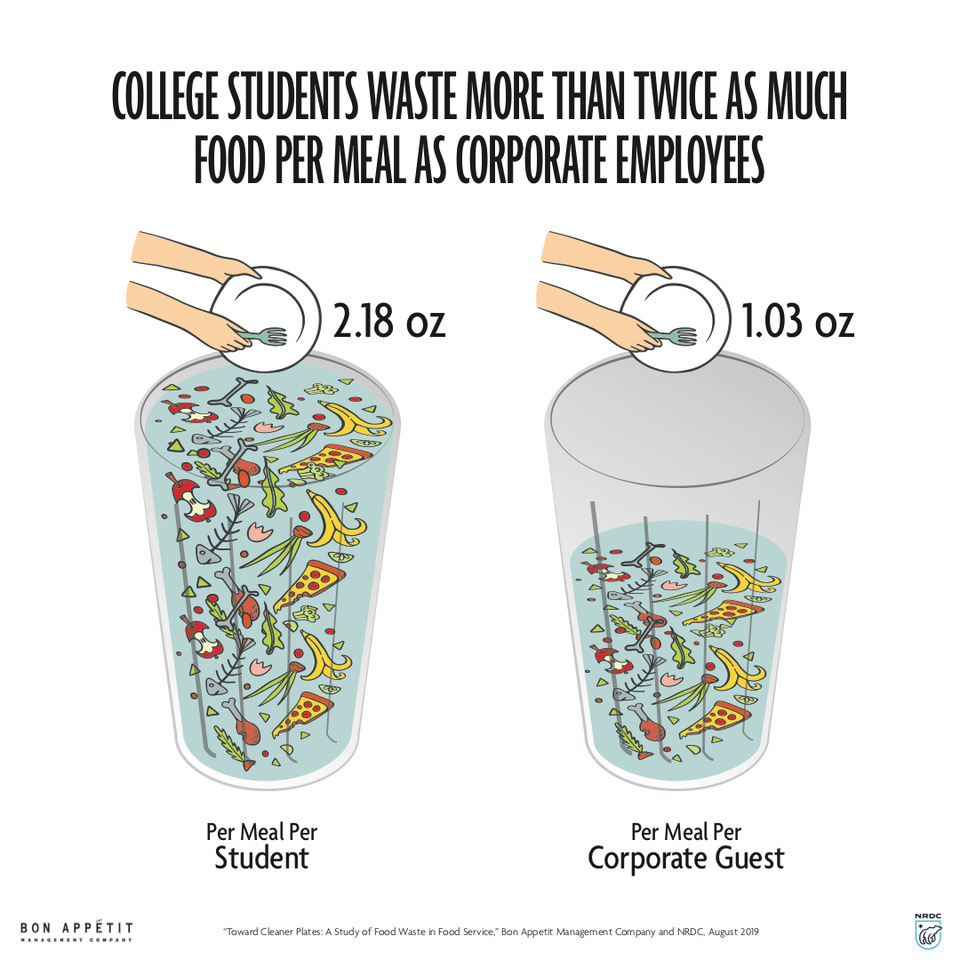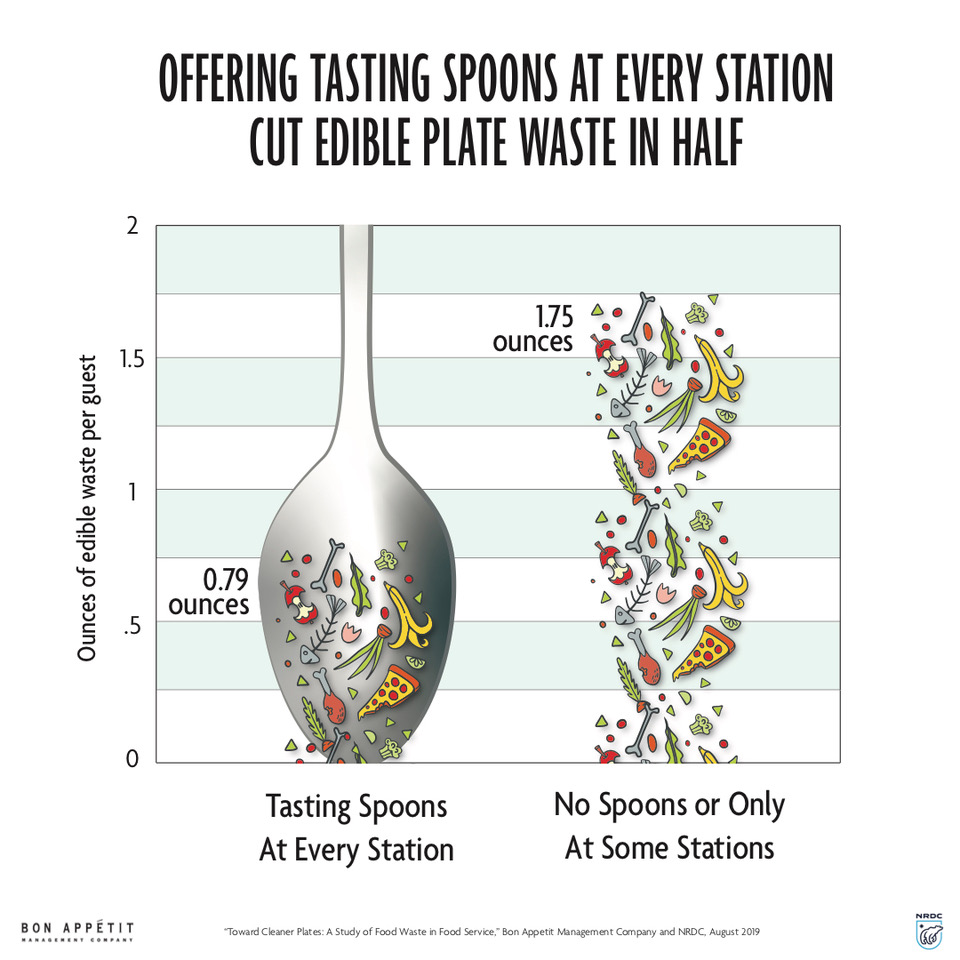Study Finds College Students Waste 112 Pounds of Food Per School Year
 Food service pioneer Bon Appétit Management Company collaborated with environmental nonprofit NRDC to understand causes of edible plate waste in food service environments and seek solutions
Food service pioneer Bon Appétit Management Company collaborated with environmental nonprofit NRDC to understand causes of edible plate waste in food service environments and seek solutions
Palo Alto, CA (August 20, 2019) — Until now, little research has been done to understand why people dining out leave food on their plates. It’s a problem that the environmental nonprofit Natural Resources Defense Council (NRDC) estimates to account for 20 percent of all food wasted in the U.S. To better understand the causes of edible plate waste in university dining and corporate café environments, Bon Appétit Management Company, in collaboration with NRDC, conducted a study whose findings are released today in the whitepaper “Toward Cleaner Plates: A Study of Plate Waste in Food Service.”
Key findings include:
 College students were found to waste 112 pounds of waste per student per school year, which can really add up on a large campus.
College students were found to waste 112 pounds of waste per student per school year, which can really add up on a large campus.
- That’s more than twice as much food per meal as corporate employees, with waste averaging 2.18 oz per guest at higher education accounts, versus 1.03 oz at participating corporate locations on average.
- People in an all-you-care-to-eat environment waste more food than in a pay-as-you-order one.
- People waste less food at breakfast than at lunch or dinner, with the most food being wasted at dinner.
- Offering tasting spoons at every food service station is associated with significantly less plate waste.
- Providing food service employees with explicit instruction around portion serving sizes from their managers contributes to less edible waste per guest than at cafés when either ambiguous or no portion instructions are given to staff.
- Entrée plate size, the availability of trays, and self-service versus staff-portioned items did not significantly affect the amount of edible plate waste.
“The study found that our guests of all ages produced an average of over 110 pounds of edible food going to waste per person in a full year — and that’s just for their meals with us,” said Claire Cummings, waste programs manager at Bon Appétit. “With a better understanding of what’s being left on peoples’ plates and why, we can develop concrete ways that food service providers can reduce that number and work toward cleaner plates and less waste.”
 Guided by experts from NRDC, the Bon Appétit research team tracked how much plate waste was generated at 20 Bon Appétit cafés across the country over a variety of meal periods. The study was conducted at a sample of geographically diverse Bon Appétit locations — evenly split between cafés located at business and industry locations and institutions of higher education — for two meal periods each, totaling 40 meal periods. They were surveyed between May 2018 and March 2019. Through the research, plate scrapings were obtained from more than 12,000 individuals, 1,572 of whom completed a survey.
Guided by experts from NRDC, the Bon Appétit research team tracked how much plate waste was generated at 20 Bon Appétit cafés across the country over a variety of meal periods. The study was conducted at a sample of geographically diverse Bon Appétit locations — evenly split between cafés located at business and industry locations and institutions of higher education — for two meal periods each, totaling 40 meal periods. They were surveyed between May 2018 and March 2019. Through the research, plate scrapings were obtained from more than 12,000 individuals, 1,572 of whom completed a survey.
“No one sets out to waste good food, but when it happens, we’re throwing out everything it takes to get it to our plates — water, energy, money, and more,” said JoAnne Berkenkamp, senior advocate at NRDC. “Climate scientists the world over tell us that what we eat and what we waste matter to the future of our planet. Our research points to an opportunity for food service providers to empower college students — the generation that will be most impacted by climate change — to fight back with their forks.”
It is time to call attention to the issue of edible plate waste and move toward action to reduce it. The whitepaper points to simple, immediately implementable strategies such as consistently providing tasting spoons at every station and providing all serving staff with explicit instructions on proper portion sizes, as well as longer-term suggestions that could help the food service industry dramatically reduce such waste.
Read the “Toward Cleaner Plates: A Study of Plate Waste in Food Service” report (PDF).
About Bon Appétit Management Company
Bon Appétit Management Company (www.bamco.com) is an on-site restaurant company operating 1,000-plus locations in 33 states for corporations, universities, and museums. Bon Appétit chefs cook from scratch, including sauces, stocks, and soups. The Palo Alto–based food service company is a recognized industry leader in environmentally and socially responsible practices, with awards from organizations including the Sustainable Purchasing Leadership Council, Acterra, James Beard Foundation, and many others.
Media contact: Bonnie Powell, [email protected]
About Natural Resources Defense Council
The Natural Resources Defense Council (NRDC) is an international nonprofit environmental organization with more than 3 million members and online activists. Since 1970, their lawyers, scientists, and other environmental specialists have worked to protect the world’s natural resources, public health, and the environment. NRDC has offices in New York City, Washington, D.C., Los Angeles, San Francisco, Chicago, Bozeman, MT, and Beijing. Visit them at www.nrdc.org and follow them on Twitter @NRDC.